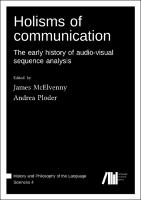Holisms of communication
The early history of audio-visual sequence analysis (Volume 4)
Contributor(s)
McElvenny, James (editor)
Ploder, Andrea (editor)
Collection
Knowledge Unlatched (KU)Language
EnglishAbstract
A central pillar of contemporary communication research is the analysis of filmed interactions between people. The techniques employed in such analysis first took on a recognizably modern form in the 1970s, but their roots go back to the earliest days of motion picture technology in the late nineteenth century. This book presents original essays accompanied by written responses which together create a dialogue exploring early efforts at audio-visual sequence analysis and their common goal to capture the "whole" of the communicative situation. The first three chapters of this volume look at the film-based research of Gestalt psychologists in Berlin as well as psychologists in the orbit of Karl and Charlotte Bühler in Vienna in the first decades of the twentieth century. Most of these figures – along with many other Central European scholars of this era – were driven into exile in the United States after the rise of National Socialism in the 1930s. This scientific migration led to the cross-pollination of communication studies in America, an outcome visible in the leading project in interaction research of the mid-twentieth century, the Natural History of an Interview. The following two chapters examine this project in its historical context. The volume closes with a critical edition of a treasure from the archives: the transcript of a speech delivered by Ray Birdwhistell, a key participant in the Natural History of an Interview project and founder of kinesics.
Keywords
Language Arts & Disciplines; LinguisticsDOI
https://doi.org/10.5281/zenodo.5142265ISBN
9783985540174Publisher
Language Science PressPublisher website
https://langsci-press.org/Publication date and place
2021Grantor
Imprint
Language Science PressClassification
Linguistics


 Download
Download